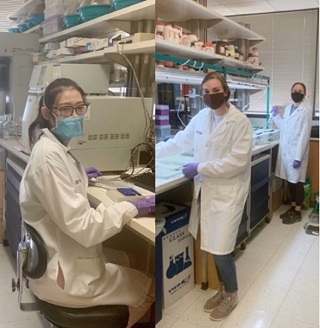Hot Off the Press
The SRP regularly highlights basic and applied research and activities from the program, spanning multiple disciplines. The SRP-funded research outcomes highlighted below summarize innovative research accomplishments that address current public and environmental health concerns.
Research Briefs
Edible Sorbents May Protect Against Metal Toxicity
A new study from NIEHS-funded Superfund Research Program (SRP) Center researchers suggests that edible sorbents may be an effective treatment to reduce heavy metal exposure from consumption of contaminated water and food. According to the researchers, this is the first evidence that edible sorbents can bind heavy metal mixtures and protect against their toxicity in a living organism.

New Tool Monitors a Flame Retardant in Sediment
Researchers at the University of California, Davis (UC Davis) Superfund Research Program (SRP) Center developed a new, inexpensive tool to reliably detect small amounts of tetrabromobisphenol A (TBBPA) in environmental samples. TBBPA is a flame retardant commonly found in household dust, soil, water, sewage, sludge, and sediments.
Treating Water with Chemical Oxidation May Produce Harmful By-Products
Chemical oxidation is a process commonly used to treat water contaminated with aromatic compounds like benzene. But, unexpected and potentially harmful breakdown products may result from this treatment process, according to a recent study from the NIEHS-funded University of California, Berkeley Superfund Research Program Center.
Environmental Factor Articles
Small business commercializes technology with new grant
Microvi Biotechnologies, Inc. received a new kind of grant from the NIEHS Superfund Research Program (SRP), to further enhance and commercialize their technology for converting hazardous compounds in water into less harmful substances. The grant is part of the NIEHS Small Business Innovation Research (SBIR) Commercialization Readiness Pilot Program . Microvi plans to use the funding to improve its manufacturing process.
New framework helps researchers return results to participants
NIEHS grant recipients developed a framework and set of recommendations to help environmental health researchers return research results to study participants, a process called result report-back . According to the authors, report-back has the potential to improve environmental health education and communication and overall public health. Despite strong recommendations for report-back, researchers share results with study participants infrequently and inconsistently, the authors said.
Progress in Research Webinars
The Progress in Research webinar series this fall highlighted research from the SRP Centers awarded grants in 2020. These awards were made as part of the Multiproject Center Grant (P42) solicitation - RFA-ES-18-002. In each session, awardees described their research projects, accomplishments, and next steps. The purpose of these webinars is to facilitate a dialogue between the researchers, field practitioners, and stakeholders early in the stages of research progress so that these new projects are on a trajectory for successful technology transfer and application by end users. The series attracted more than 1,400 live participants over four sessions.
Session I - Metals
October 21, 2 - 4 PM EDT
Featured Harvard School of Public Health, University of North Carolina-Chapel Hill, and University of Arizona
Session II - Legacy and Emerging Contaminants (PAHs, PCBs, PFAS)
October 28, 1 - 3 PM EDT
Featured University of Kentucky, Oregon State University, and Baylor College of Medicine
Session III - Vulnerable Populations
November 9, 2 - 3:30 PM EST
Featured Northeastern University and University of Alabama - Birmingham
Session IV - Emerging Exposures
November 19, 2 - 4 PM EST
Featured North Carolina State University, University of Iowa, and Louisiana State University
to Top



